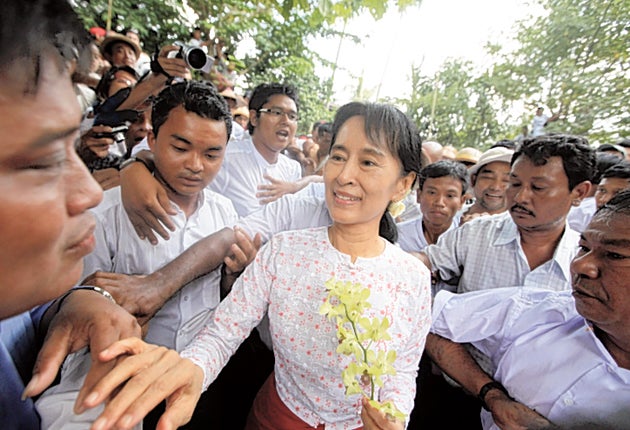The Week In Radio: In any language, the BBC World Service does a world of good

In a revealing glimpse it emerged this week that during her house arrest, Aung San Suu Kyi spent up to six hours a day listening to the BBC World Service. At a time when we're supposed to be focusing on British exports, the World Service is one export that often gets overlooked. Granted, it costs us money and is provided free to customers, but in terms of power and influence its earnings are unquantifiable. You could say that the BBC, broadcasting to 180 million people around the world, is our biggest brand.
The World Service was recently dealt a double whammy. Firstly a budget cut of £67m over four years that will certainly involve hundreds of job losses and ultimately the loss of some of its 31 language services. The NUJ suggests the Macedonian, Serbian, Vietnamese and Russian language services could either be closed or radically reduced. The second change is more double-edged. It's often forgotten that since it was founded in 1932 with a brief to promote British culture, the World Service has been funded by the Foreign Office, a situation which has allowed some regimes to describe it as a "state broadcaster". Henceforth under the licence fee it can proclaim its independence. Most have welcomed this move, but there are dangers too. If the BBC has to prioritise broadcasting to say Moldavia, or Manchester, who will get squeezed?
The English-language service, which reaches 39 million around the world and about 1.3 million here at home, is also scheduled for cuts, and arts programming – as always – is first in line. Regular drama will be scrapped from April and the Proms and Wimbledon have also been decommissioned. Science looks a bit safer thankfully, judging by the wonderfully ambitious Exchanges at the Frontier, which sets out to tackle science at its mind-boggling cutting edge. So far, A C Grayling has tackled malaria and ageing, and there's Alzheimer's coming up. On Saturday he could be heard discussing particle physics with the go-to guy for String Theory, Professor Brian Greene.
String Theory, as you know, attempts to unite the theories of gravity and quantum which have so far seemed stubbornly irreconcilable. There are many who say that if you think you understand String Theory, you don't understand it, but Professor Greene is so good at metaphors (the earth moving through a warped space time environment is "a bowling ball on a trampoline") that the credulous listener believes for a moment they might actually grasp it. However, to make String Theory work, you need to envisage more than three dimensions, and it was here that O-level science really fell down. We were asked to imagine a loaf of bread. "One slice contains everything that is the universe, but there are other slices of bread in the cosmic loaf and in an alternate version of the Big Bang two giant slices of bread slam into each other and release so much energy that over time they re-coalesce into stars and people."
To be honest, at this point the discussion might as well have been in one of the other, more distant language services, as far as my own comprehension went. But Grayling was serenely unfazed throughout, and most importantly, he let the expert do the talking.
Just as tricky an interview, in a different way, was conducted by Fergal Keane in the first of Radio 4's Taking a Stand, in a dignified and moving exchange with André Hanscombe, the widower of Rachel Nickell. The most chastening part was Hanscombe's account of the media when he and his young son visited Wimbledon Common. "They wouldn't give us any space," he said. "It was primal, a totally uncivilised experience. You see how thin the veneer of civilisation really is." Thus, whether it's as lifeline or liability, twin facets of the media were on display this week.
jane@janethynne.com
Join our commenting forum
Join thought-provoking conversations, follow other Independent readers and see their replies
Comments
Bookmark popover
Removed from bookmarks